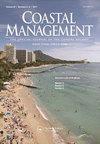First Steps at First Point: Protecting California Surf Breaks and the Malibu Historic District
IF 1.9
4区 环境科学与生态学
Q4 ENVIRONMENTAL SCIENCES
引用次数: 6
Abstract
Abstract Surf breaks and surfing areas exemplify the human dimensions of coastal ecosystems—places connecting people and nature and from which history, culture, tradition, economic activity, and even political conflict emerge. We employed a signature policy instrument of American historic preservation, the National Register of Historic Places (National Register), as a context to both evaluate and ultimately recognize these connections through public policy at California’s famed Malibu surfing area. The Malibu Historic District is the first National Register listing centered on surfing history and the first continental United States surfing area protected for its cultural and historic significance. This model of surf break protection: (1) is explicitly site-specific, (2) aims to not just consider historic significance but secure specific legal protections and provisions because of it, (3) places surfing within the set of claims regarding historical, cultural, and economic significance, and (4) secures protections based directly on significance. The analysis of natural sites through frameworks such as the National Register, as a rationale for other surf breaks and a qualifying step for additional protections at Malibu, is well-suited to California’s particular coastal resource management environment.第一步在第一个点:保护加州冲浪休息和马里布历史区
摘要冲浪区和冲浪区体现了沿海生态系统的人类维度——连接人与自然的地方,历史、文化、传统、经济活动甚至政治冲突都是从这里产生的。我们采用了美国历史保护的标志性政策工具——国家历史遗迹登记册(National Register of historic Places,简称National Register)作为背景,通过加州著名的马里布冲浪区的公共政策来评估并最终承认这些联系。马里布历史区是第一个以冲浪历史为中心的国家登记区,也是第一个因其文化和历史意义而受到保护的美国大陆冲浪区。这种冲浪保护模式:(1)明确针对特定地点,(2)不仅考虑历史意义,还因此确保具体的法律保护和规定,(3)将冲浪置于关于历史、文化和经济意义的一系列主张范围内,(4)直接基于意义确保保护。通过国家登记册等框架对自然遗址进行分析,作为其他冲浪休息的理由和马里布额外保护的合格步骤,非常适合加利福尼亚州特定的海岸资源管理环境。
本文章由计算机程序翻译,如有差异,请以英文原文为准。
求助全文
约1分钟内获得全文
求助全文
来源期刊

Coastal Management
环境科学-环境科学
CiteScore
6.00
自引率
0.00%
发文量
24
审稿时长
>36 weeks
期刊介绍:
Coastal Management is an international peer-reviewed, applied research journal dedicated to exploring the technical, applied ecological, legal, political, social, and policy issues relating to the use of coastal and ocean resources and environments on a global scale. The journal presents timely information on management tools and techniques as well as recent findings from research and analysis that bear directly on management and policy. Findings must be grounded in the current peer reviewed literature and relevant studies. Articles must contain a clear and relevant management component. Preference is given to studies of interest to an international readership, but case studies are accepted if conclusions are derived from acceptable evaluative methods, reference to comparable cases, and related to peer reviewed studies.
 求助内容:
求助内容: 应助结果提醒方式:
应助结果提醒方式:


